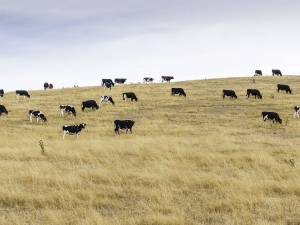State of the Dairy Nation 2024/25: DairyNZ Highlights Record Milk Production and Export Growth
DairyNZ's chief executive Campbell Parker says the 2024/25 dairy season reinforces the importance of the dairy sector to New Zealand.
 Levies are adjusted to reflect the latest industry farm gate values and slaughter volumes for dairy and beef stock.
Levies are adjusted to reflect the latest industry farm gate values and slaughter volumes for dairy and beef stock.
TB differential slaughter levy rates are changing with dairy animals paying $12.25/head, an increase of 75c from next month.
Ospri says that each year, the slaughter levy rates for beef and dairy cattle are reviewed under the TBfree Funders’ Agreement to ensure that the overall funding of the TBfree programme aligns with the agreed funding levels.
Levies are adjusted to reflect the latest industry farm gate values and slaughter volumes for dairy and beef stock.
The levy for beef animals drop by 25c to $4.50/head.
Ospri says The TB differential slaughter levy is collected to support funding of the programme on behalf of beef and dairy industries. The funding shares change annually based on shifts in the relative size and value of each industry.
“We communicate any adjustments to the differential slaughter levy to DairyNZ, Beef + Lamb New Zealand and Deer Industry New Zealand — the industry levy bodies in the TBfree Funders’ Agreement. Adjustments are made in line with the annual funding level specified.
“Adjustments in differential levy rates don’t provide an overall increase in the annual funding of the TBfree programme — but do ensure consistent funding to enable the programme to deliver.”
Ospri advises both beef and dairy farmers to keep their NAIT accounts up to date and record the correct animal type to ensure they are paying the correct TB slaughter levy.
Donald Trump's latest tariff tantrum has again thrown the world of trade into a new round of turmoil and uncertainty, and NZ is caught up in it.
The third edition of the NZ Dairy Expo, held in mid-February in Matamata, has shown that the KISS principle (keep it simple stupid) was getting a positive response from exhibitors and visitors alike.
Twenty years ago, South African dairy farm manager Louis Vandenberg was sent to a farm in Waikato to provide training on Afimilk technology.
Strong farmgate milk price is helping boost investment on farms, says PGG Wrightson chief executive Stephen Guerin.
Fonterra's 460 milk suppliers in Australia, who will switch to Lactalis end of this month, are unfazed with the impending change.
The 5+ A Day Charitable Trust has launched a collection of affordable recipes designed to turn everyday vegetables into seasonal stars.